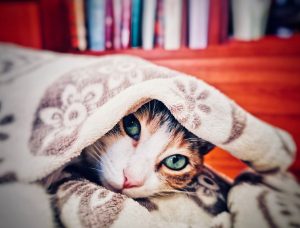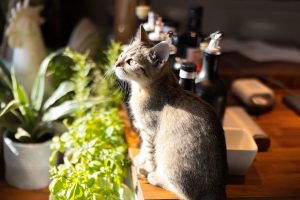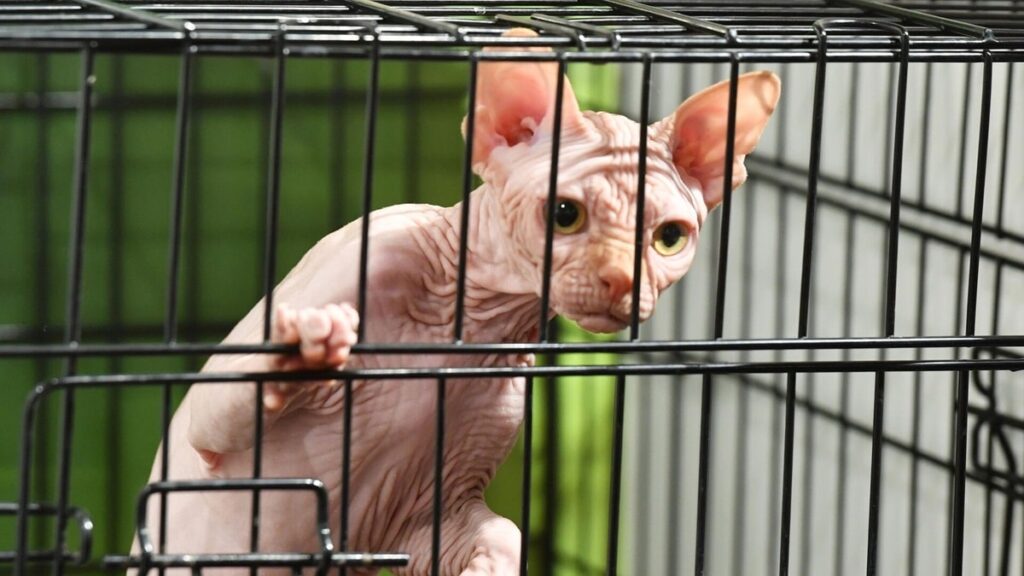In recent years, our understanding of cats has shifted significantly. Jackson Galaxy, a well-known cat behaviorist, brings a wealth of experience to the topic, having spent over 35 years in the company of felines. His video outlining ten things he wishes he knew before adopting cats is an insightful guide for current and prospective cat owners. By examining the content, we can derive key points about feline behavior, care, and the complexities of living with these fascinating animals.
1. Introducing Cats to Other Pets: A Gradual Process
Galaxy emphasizes the importance of a slow, methodical introduction when bringing a new cat into a home with other pets, especially dogs. Contrary to old wisdom, which suggested that pets would “work it out,” Jackson warns that hasty introductions can lead to permanent mistrust between animals. For instance, if a dog chases a cat during their first interaction, the cat’s confidence may be damaged beyond repair. Galaxy recommends ensuring that dogs are well-trained, particularly in commands like “down-stay,” before attempting introductions. Keeping the dog on a leash initially can prevent unfortunate incidents.
This reflects current research which highlights the importance of carefully controlled introductions between pets to reduce stress and ensure long-term harmony in multi-pet households.
2. Resource Management: Keeping Food and Litter Separate
A key consideration in managing households with cats and dogs is the careful placement of food, water, and litter resources. Galaxy advises that dogs should not have access to litter boxes, as they may eat the contents, making the box unsafe for cats. Similarly, feeding cats and dogs in separate spaces ensures both animals respect each other’s feeding areas, reducing the risk of conflicts.
Research supports the idea that resource guarding behaviors can develop in both cats and dogs, making this separation essential for preventing aggression and ensuring the well-being of both pets.
3. Nail Care: Essential for Cats and Their Surroundings
One of the critical tips Galaxy provides is to keep a cat’s nails trimmed. Cats’ nails grow quickly and can curve under, sometimes causing discomfort or injury. Trimming nails every three to four weeks helps prevent damage to household items and ensures cats remain comfortable.
Nail trimming also benefits the relationship between owner and pet. According to studies, regular grooming, including nail care, can improve the bond between pets and owners by promoting trust and physical contact.
4. Optimal Nutrition: A Life-Changing Lesson
Galaxy recounts his own tragic experience with his first cat, Rabbi, who developed diabetes after being fed dry kibble for many years. Cats are obligate carnivores, meaning they need a meat-based diet to thrive. Moreover, they get much of their hydration from their food, not just water. The risks of improper diets, such as diabetes, obesity, and poor dental health, highlight the importance of understanding a cat’s nutritional needs from the start.
Many experts today agree with this emphasis on high-quality, moisture-rich food for cats, advocating for the inclusion of wet food and species-appropriate diets to support long-term health.
5. Enrichment: Cats Need Stimulation
A common misconception is that cats are low-maintenance pets. Galaxy debunks this myth by stressing the importance of enrichment through play and environmental stimulation, also known as “catification.” Cats need vertical spaces to climb, explore, and feel secure, which enhances their confidence and reduces stress.
This aligns with the growing body of research on feline environmental enrichment, which shows that mentally stimulating activities and enriched environments significantly improve a cat’s mental and physical health, reducing behavioral issues like aggression and anxiety.
6. Cat-Proofing Your Home: A Safety Priority
In one particularly harrowing example, Galaxy describes an incident where his cat, Valoria, suffered a serious reaction, initially thought to be caused by ingesting poison. Although it turned out to be a different issue, this experience underscores the need for cat-proofing the home. Cats, much like toddlers, can access areas we wouldn’t expect, such as cabinets and shelves, putting them at risk of poisoning or injury.
Implementing child locks on cabinets and removing hazardous substances from a cat’s reach is essential. Many veterinarians agree that homes should be thoroughly inspected and modified to prevent accidents involving curious cats.
7. Veterinarians and Pet Sitters: Establishing a Support Network
Galaxy stresses the importance of having a trusted veterinarian and pet sitter in place before adopting a cat. Relying on recommendations from friends and researching local services can prevent unexpected complications. This support network becomes particularly crucial in emergencies, whether they involve the cat’s health or the owner’s need to travel.
The need for a well-rounded support system is echoed by animal behavior experts, who emphasize that having a go-to vet and sitter ensures that both routine care and emergency situations are handled efficiently and with minimal stress for the pet.
8. Pet Insurance: A Worthwhile Investment
Veterinary bills can add up quickly, especially in the case of emergencies. Galaxy strongly advocates for pet insurance, urging potential cat owners to explore different policies before they face a financial burden. With advancements in veterinary care, pet insurance can offer peace of mind, covering the costs of treatments that might otherwise be unaffordable.
Pet insurance has grown in popularity in recent years, with many studies showing that insured pets are more likely to receive necessary medical attention due to the lower financial barriers.
9. Emergency Preparedness: A Plan for the Unexpected
Being prepared for emergencies is a critical part of responsible cat ownership. Galaxy advises cat owners to have an emergency plan in place, including a “go-bag” with supplies and making sure the cat is comfortable with their carrier.
Disaster preparedness experts often recommend that pet owners practice fire drills and other emergency scenarios to ensure that they and their pets can evacuate safely if needed.
10. Understanding the History and Evolution of Cats
Finally, Galaxy highlights the importance of understanding the evolutionary history of cats. Knowing that today’s domestic cats are closely related to their wild ancestors can help owners appreciate certain behaviors, such as scratching or hunting instincts. This knowledge fosters empathy and patience, as owners can better understand why their cats behave in certain ways.
This fascination with feline history is supported by studies in feline behavior, which often draw on the wild cat lineage to explain modern domestic behaviors.
Conclusion
The insights shared by Jackson Galaxy resonate with cat behavior research and expert advice, offering a comprehensive guide for anyone considering adopting a cat. From understanding the importance of proper introductions to learning about nutrition and enrichment, the lessons learned can dramatically improve the quality of life for both cats and their owners. By applying these research-backed practices, cat owners can foster a harmonious and healthy relationship with their feline companions.
Frequently Asked Questions (FAQ) About Owning a Cat
Yes, owning a cat can be costly. Expenses include adoption fees, food, litter, toys, grooming tools, and veterinary care for vaccinations and health issues. Adoption is generally less expensive than purchasing from breeders.
Cats need considerable attention and care. They can be mischievous and may require patience to manage their behaviors, such as scratching furniture or being vocal. It’s essential to dedicate time to play and bond with your cat.
Cats are known for their sleep habits, averaging 15 to 20 hours a day. While they may nap during the day, they can be quite active at night, so you may experience some nighttime antics.
Yes, regular veterinary visits are crucial for vaccinations, health check-ups, and treatments for any health issues or parasites. These visits can add to your overall expenses but are essential for your cat’s health.
Yes, neutering or spaying is recommended to prevent unwanted litters and can help regulate their behavior. It can also reduce the risk of certain health issues.
Hairballs can appear cylindrical or sausage-like, not as balls. Occasional hairballs are normal, but frequent coughing or gagging can indicate a health problem, and you should consult a veterinarian.
Cats are natural hunters and need stimulation. Engaging them in play with toys like laser pointers, feather wands, or strings is essential for their physical and mental well-being.
If your cat is allowed to roam outdoors, it’s wise to equip them with a collar and identification tag or have them microchipped to help ensure their safe return if they get lost.
While cats groom themselves, they may occasionally need a bath if they become dirty or infested with fleas. Bathing can be challenging, so it’s recommended to prepare by trimming their claws and using gentle methods.
Absolutely! Despite their demanding nature, cats offer companionship and can improve your mental health. Their purring is known to reduce stress levels, making them wonderful pets that bring joy and comfort.
Сучасні підходи до виховання домашніх улюбленців у 2026.
⚠️ We suggest that you read all the opinions on our portal and take note of them at your own discretion. Do not self-medicate! In our articles we collect the latest scientific data and opinions of authoritative experts in the field of health care. But remember: only a doctor can diagnose and treat.
The portal is intended for users over 13 years old. Some materials may not be suitable for children under the age of 16. We do not collect personal data from children under 13 without parental consent.We have a small request. We strive to create quality content about pet care, and we make it available for free to everyone because we believe everyone deserves accurate and useful information.
Advertising revenue only covers a small portion of our costs, and we want to continue to provide content without having to increase advertising. If you have found our content useful, please support us. It only takes a minute, but your support will help us reduce our reliance on advertising and create even more useful articles. Thank you!













